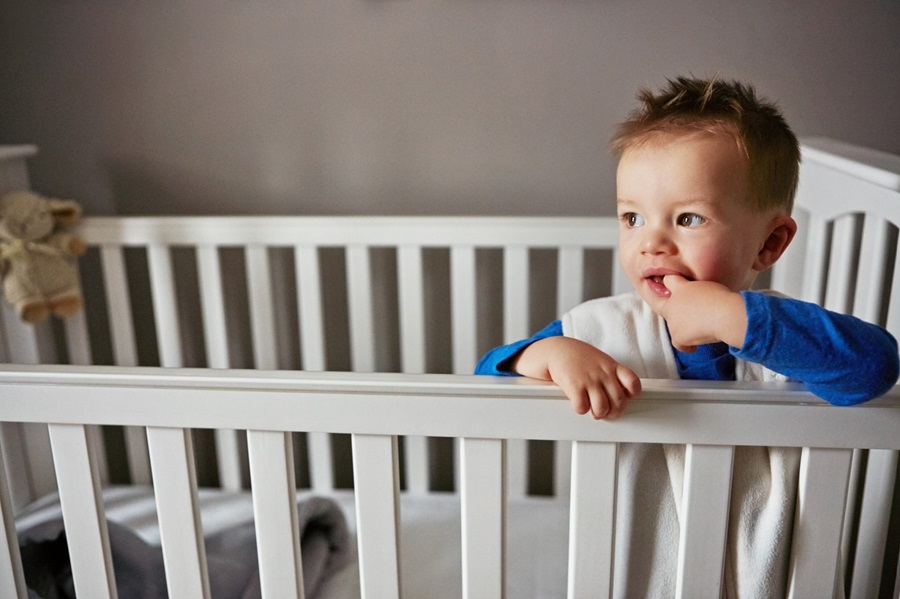- Home
- Mind & body
- Sleep regression: what happens when your baby’s sleep habits change, overnight!
At CBHS we help you manage your health challenges. We believe in offering you the services, support and tools you need to live your best life.
Health and Wellness Programs are available to support eligible members towards a healthier lifestyle. Each Health and Wellness Program is subject to its own eligibility criteria.
Contact us for more information and to confirm your eligibility for a program.
Sleep regression: what happens when your baby’s sleep habits change, overnight!

Does this sound familiar? You’ve set up a bedtime routine that works for your baby, they’re sleeping well during their daytime naps and getting solid bursts of evening sleep, but then, without warning, their sleep habits change!
Before you start second guessing yourself – and your baby’s sleeping patterns – relax. Erratic sleep – or sleep regression – at certain ages in your child’s life is perfectly normal. In fact, these stages are a healthy part of your baby’s development that generally begin at four months old.
What is sleep regression?
To put it simply, sleep regression is a period when your baby – with (relatively) predictable sleep patterns – suddenly starts experiencing disjointed, or poor sleep. Sleep regression is generally related to illness, teething, developmental milestones like learning to sit up and crawl or even a change in routine. The regression could also be a result of your baby’s sleep needs evolving.
What are the signs?
By the time your child is four months old, you should be quite accustomed to their sleeping habits and all the little quirks you’ve come to know and (hopefully!) love. So, if you start seeing the following changes, this is when you can be assured that you haven’t done anything ‘wrong’, it’s all part of your baby’s development.
- Resisting sleep at nap time or in the evening
- Difficulty falling asleep
- Naps are shorter – or skipped altogether!
- Waking up frequently at night
- Fussing and crying.
It’s true, this time can be a disruptive and challenging time for your household. No one is getting much sleep and your baby will be feeling the effects of little to no rest. But here’s the good news – sleep regressions don’t last forever!

How long does each sleep regression last?
It may feel like years when you’re sleep deprived and the house is a mess, but the truth is, your baby’s sleep regressions will generally only last between three to six weeks. And if you find that their sleep patterns have resolved within a week or so, it’s likely their habits were disrupted because of a temporary issue like an illness or teething.
“Sleep regression is a period when your baby’s sleeping patterns change to coincide with development milestones and even teething.”
Sleep regression stages
You already know your baby is a unique little human – their sleep regressions are no exception. Which is why the age when they first occur can vary.
The most common sleep regression stages happen around the following ages:
- Four months
- Six months
- Eight months
- Twelve months
- Eighteen months
- Two years old.
Here’s a summary of a few key sleep regression stages:
Six-month sleep regression
This is a relatively short regression stage that usually occurs because babies are hungrier during the night and wake more regularly for feeds. Your baby is replenishing the calories they used during the day practicing their new skills like crawling and sitting up! Teething and separation anxiety are also factors.
Eight-month sleep regression
At eight months old, your baby is very busy learning to pull themselves up, crawling and generally getting used to this thing called life! They’re also trying out their language skills and may drop one of their naps.
Twelve-month sleep regression
Your baby may completely miss this stage which is normal. But just like the other regression stages, this period is usually attributed to their rapidly expanding skills and sharper awareness of the world. If your baby is experiencing this stage, you can help the regression pass sooner by maintaining their regular bedtime routine.
Eighteen-month sleep regression
Welcome to toddlerhood and a world of changes! Your child is going through lots of development milestones during this stage. Their 24-hour sleep-wake cycle is changing which may mean your toddler will fight bedtime more than usual! They’ll also crave more independence and fight to stay awake longer to practice their new skills. Separation anxiety may show up in this stage too and they won’t want to be away from you for too long.
Two-year-old sleep regression
This is typically the final regression stage for your child. Some causes of the two-year-old sleep regression can include significant changes like potty training and moving out of their cot. A growing imagination can also bring on nightmares and more separation anxiety. So, it’s a good idea to introduce the ‘life changes’ one at a time and stretch out the waking hours between their nap and bedtime
Your child might even start climbing out of their cot during this sleep regression which is generally a sign that it’s time to move them into a bed for a safer sleep environment.
Other common sleep regression ages
Parents commonly report that their babies went through sleep regressions at the seven, nine, 10 and/or 15-month marks. Your baby may experience these regressions, or not. And just like the key sleep regression stages we’ve covered in this article, these stages are likely to coincide with your baby’s mastery of other skills around this time. A sleep regression at seven, nine, 10 and/or 15-months may also just be one of the more common stages arriving earlier or later for your baby.

Some sleep tips to help your baby – and you – through this time
It’s normal to feel frustrated and sleep deprived as you and your baby navigate the sleep regression stages. You may also feel helpless watching your baby try and cope with sleepless days and nights. But a good way to feel like you’re ‘back in control’ (or as much as you can be with a baby!) is to revisit the sleeping routine you put into place when you first brought your baby home.
- Keep nap and bedtimes consistent
- Make sure your baby’s basic needs are met before sleep
- Make sure their ‘wake windows’ are correct for their age. That means the number of hours your baby is awake between naps/sleep
- Feel free to cuddle, rock or nurse your baby to sleep
- Use white noise, gentle music or blackout curtains.
You can even use meditation techniques for toddlers as an effective and calming way to encourage sleep.
Like most testing times in parenthood – this too shall pass!
Whether you have one child or several (!), adjusting to a baby’s evolving sleep patterns can be a challenge at the best of times. So, it’s important to remember that sleep regression at four months or two years old, is a healthy part of your baby’s development.
Your infant or toddler will generally experience sleep disruptions if they’re ill, teething or reaching a new milestone like sitting up or crawling. That’s why the best thing you can do is be patient and approach each change with love, lots of cuddles and soothing words.
If you’re struggling with your child’s sleep patterns, you can always reach out for professional help; set up a time to meet with your family health nurses, your GP or paediatrician as well as child and family psychologists.
Ultimately, sleep regressions will pass and by the time your baby is going on their first date, those sleepless nights will be a fading memory.
All information contained in this article is intended for general information purposes only. The information provided should not be relied upon as medical advice and does not supersede or replace a consultation with a suitably qualified healthcare professional.
Sources:
https://www.medicalnewstoday.com/articles/sleep-regression-stages
https://www.cbhs.com.au/mind-and-body/blog/all-about-sleep-the-good-the-bad-and-the-sleepy
https://www.cbhs.com.au/mind-and-body/blog/the-abcs-of-meditation-for-kids
https://karitane.com.au/stores/_sharedfiles/Brochures/Karitane_sleepneedsguide.pdf
Health and wellbeing
programs & support
You Belong to More with CBHS Hospital cover:
- Greater choice over your health options including who treats you
- Get care at home with Hospital Substitute Treatment program
- Free health and wellbeing programs to support your health challenges
Live your healthiest, happiest life with CBHS Extras cover:
- Benefits for proactive health checks e.g. bone density tests, eye screenings
- Keep up your care with telehealth and digital options
- Save on dental and optical with CBHS Choice Network providers
